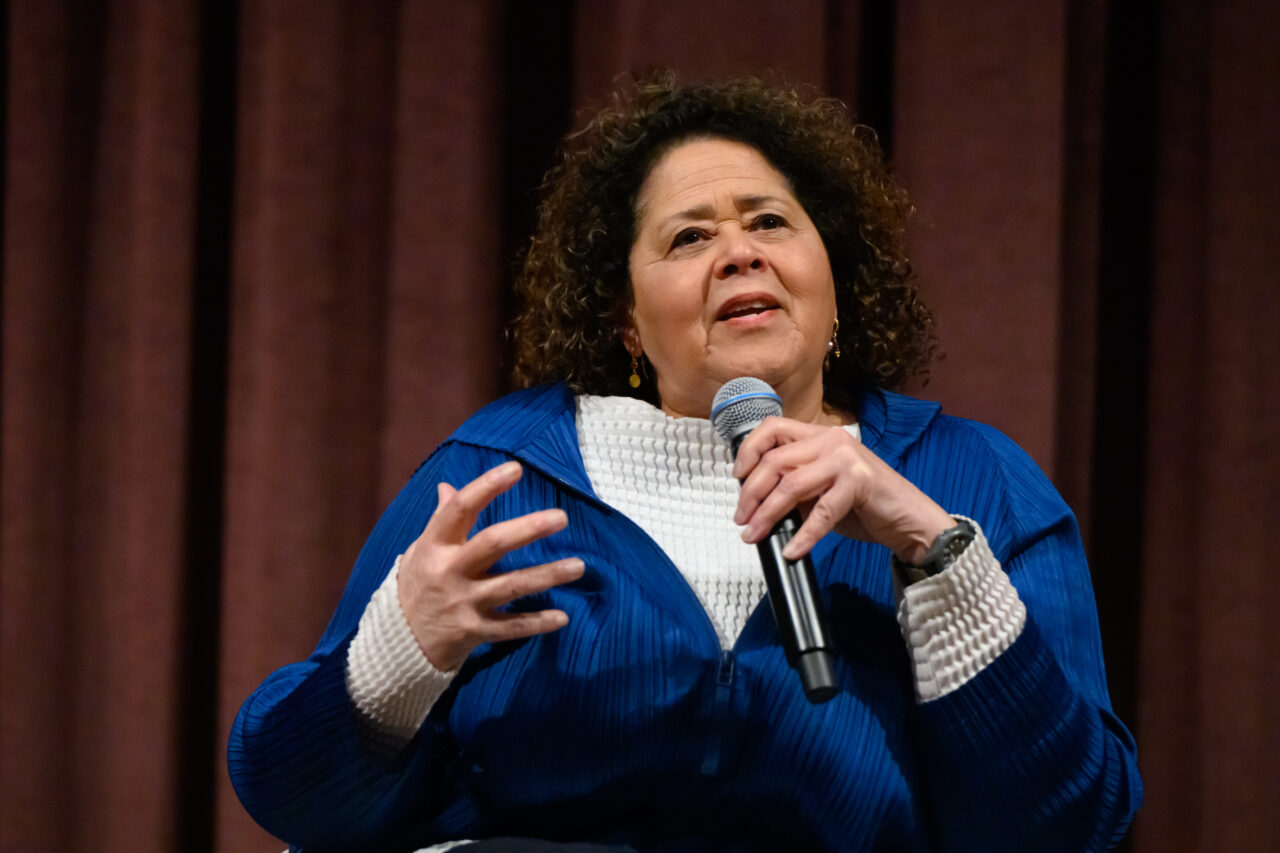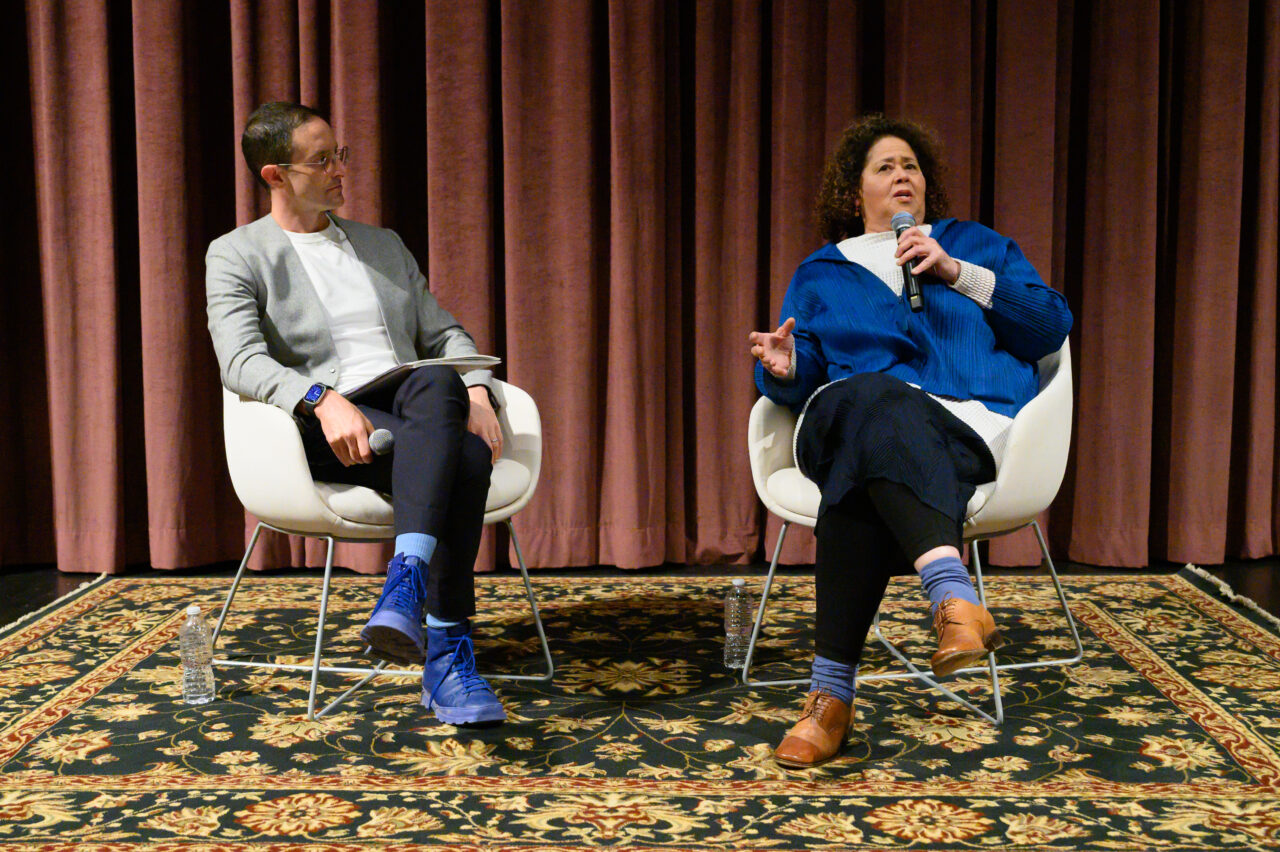Anna Deavere Smith Starts Yearlong Artist Residency

Playwright, actor, and educator Anna Deavere Smith Hon. ’97 launched her yearlong residency at Wesleyan’s Center for the Arts (CFA) on Oct. 27 with the first public staged reading of her new work This Ghost of Slavery. The cast featured 15 actors, including Associate Professor of Theater, African American Studies, and English Rashida McMahon, along with students Connor Wrubel ’25 and Raimi Bagwell ’26.
First published in The Atlantic, the work blends contemporary interviews with activists and social justice workers with her research into the archives of American slavery, revealing how historical trauma shapes present-day behavior. The play depicts events that occurred in the immediate aftermath of Emancipation in 1864, when former slave owners in Maryland re-indentured adolescents on plantations under the guise of “apprenticeship.” The reading was co-produced with the Long Wharf Theatre, and co-sponsored by the Center for the Humanities.
The next day, Smith met with students, faculty, and Middletown community members, and toured the Wesleyan Library’s Special Collections and Archives, before participating in an evening conversation with Joshua Lubin-Levy ’06, director of the CFA. Their conversation, “If the theater is not the place, where?” was part of the Center for the Humanities fall Monday Night Lecture Series “Dead Reckonings.”

Staged readings are essential to new play development, allowing playwrights to experience how the words on the page come to life. But a work of this size and that deals with such complex social and political questions rarely can be workshopped in the way it could be at Wesleyan, where the artistry and scholarship of Smith’s work make equal contribution to the life of the University. “For the University to invite us to be able to develop our work is an incredible gift,” Smith said. “This stuff doesn’t happen out of nowhere, and there are fewer places to do it.”
Smith said that when she started writing This Ghost of Slavery, she was thinking about the school-to-prison pipeline system she had explored in her 2015 play Notes from the Field. “How do we get this system of education that has such extraordinary disparity?” Smith asked, which led to her discovery of the Maryland apprenticeship system, and the inspiration to dramatize it. “It just blew my mind, because I’ve been chasing ‘that which is not me’ for my whole career, and so this was something that takes me back to my state and my city.”
“It was me trying to be able to really see what happened,” Smith said, “not just know what happened.”
“What does the theater offer us when it comes to these artifacts of history that are crucial for understanding the present, but are also so unsightly, one might be reluctant to bring them forward?” Lubin-Levy asked. “Maybe presenting work before it’s ‘ready’ makes it more available for some kind of reckoning, because the material is so raw in some ways that you can’t hide from the content.”
Smith said that for her the theater has the potential of being a convening place for people from a community to come together and respond to things that are right before them.
As a dramatist, Smith said she is interested in disarray, dissonance, and discord. “I worry as a dramatist that in the theater right now, and in the classroom right now, we’re too frightened of the very thing which is at the center of what we do: conflict and dialogue,” Smith said.
In writing This Ghost of Slavery, Smith incorporated conversations from the libretto she wrote for the opera The Walkers (2023) for singer Renée Fleming, based on interviews with the nonprofit organization Chicago CRED (Create Real Economic Destiny). CRED was co-founded by former U.S. Secretary of Education Arne Duncan in 2016, and seeks to reduce gun violence and help young people ensnared in gangs or the juvenile justice system. “I had this extraordinary opportunity to hear all these different stories from them,” Smith said.
Smith detailed the playwrighting process she has used since 1980, her curiosity leading her to interview people that have something fascinating to say, something they want the world to hear. “I have been trying to become America word for word,” Smith said. “I’m trying to close the gap of having grown up in a segregated city, Baltimore…I’ve been trying to close that gap, and to earn my belongingness as a human.”
Smith also presented a keynote conversation on Oct. 26 in New Haven with Khalilah Brown-Dean, Wesleyan’s Rob Rosenthal Distinguished Professor of Civic Engagement and Executive Director of the Allbritton Center for the Study of Public Life, as part of the Long Wharf Theatre’s Artistic Congress in partnership with Yale Schwarzman Center.
Smith returns to campus Jan. 21 to 25 to lead the free workshop, “Performance as a Way of Knowing” for Wesleyan undergraduate students. Students can apply to participate in the workshop by Dec. 9, 2024. Smith’s residency will conclude with a convening on campus April 9 to 12.
Learn more about Anna Deavere Smith’s residency at Wesleyan at https://www.wesleyan.edu/cfa/events/anna-deavere-smith-residency.html

